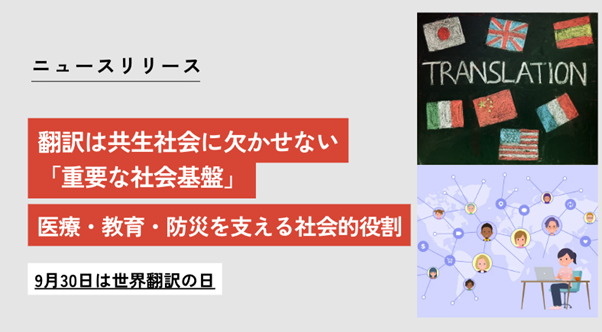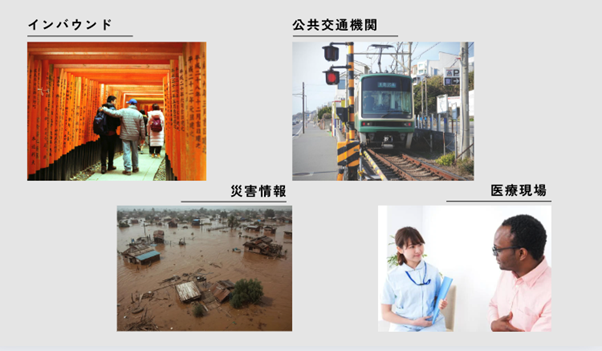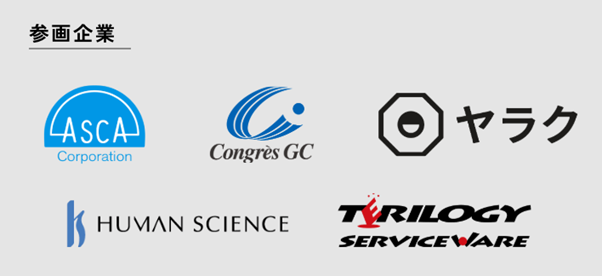"Translation is an Important Social Infrastructure Supporting a Symbiotic Society" On World Translation Day, Five Translation and Interpretation Companies Issue a Joint Statement
World Translation Day on September 30* is an international commemorative day established to shed light on the social role of translation and share its significance worldwide. In line with this day, five companies engaged in translation and interpretation have issued a joint statement (hereinafter referred to as this statement) titled "Translation is an important social infrastructure that supports a symbiotic society."
In recent years, not only has global business accelerated, but in Japanese society, due to the increase of foreign residents, inbound visitors, and the expansion of acceptance of foreign workers, translation has also become indispensable in social infrastructure areas such as construction, medical care, disaster prevention, and transportation.
This statement is issued jointly by the following companies with the purpose of broadly appealing to society once again that translation is not merely a conversion of language but has social significance.
The drafting and overall coordination of this project were undertaken by Yatsuraku Inc. (Headquarters: Shibuya-ku, Tokyo; CEO: Yu Sakanishi; hereinafter Yatsuraku).
*World Translation Day was established by the International Federation of Translators in honor of the feast day of St. Jerome, who translated the Bible into Latin, and was recognized as International Translation Day by the United Nations in 2017.
Message of the Joint Statement
- ●Translation plays a social role in supporting "people's peace of mind and coexistence"
- ●By issuing joint statements from companies involved in translation, its value is demonstrated to society as a whole
- ●Translation is an important social infrastructure that supports social peace of mind, safety, and coexistence
Social structure is changing in Japan toward an era where translation is necessary
In Japan, in addition to the settlement of foreign residents and the expansion of inbound demand for tourism, corporate overseas expansion and acceptance of foreign workers are also progressing, making multilingual information provision unavoidable. Until now, translation has been utilized as an indispensable function supporting international companies’ communication when entering overseas markets and multinational business. However, due to changes in Japan’s domestic social structure, the role of translation is expanding further.
As the number of foreigners living and staying in Japan has increased, translation has become indispensable as a foundation to protect residents' peace of mind and safety and to support a symbiotic society, even in social infrastructure areas such as disaster response, medical settings, public transportation, and education.
Multilingual information dissemination is not only for foreign residents and inbound visitors but also an initiative to make Japanese society as a whole safer and more sustainable.
●Role in protecting safety during disasters and infectious disease outbreaks: If foreign residents can evacuate and receive medical care appropriately, confusion and secondary damage will be reduced, directly contributing to the safety of Japanese residents as well.
●System supporting administrative, medical, and educational sites: By preparing multilingual guidance in advance, the burden on staff to explain everything on the spot is reduced, leading to improved efficiency of Japanese staff’s work.
●The power to support local communities and the economy: An environment where people can live and engage in activities with peace of mind enhances the vitality of the community and also leads to the development of tourism and industry.
Translation is not merely a "language conversion task."
Ensuring that people have equal access to information related to their safety and daily lives and can understand it without misunderstanding is one of the fundamental rights of society. Multilingual support is an initiative to make society as a whole safer and more sustainable, and we once again emphasize that translation is an indispensable social infrastructure as its bearer.

Examples Where Translation Serves as an Important Social Infrastructure
This statement introduces examples from participating companies to concretely demonstrate how translation functions as an important social infrastructure supporting society. These examples show that translation is a presence that benefits people's lives and supports safety and coexistence.
●Asuka Corporation: Utilization of AI Translation in Early Approval Applications for Rare Disease Therapeutics
When AnGes Inc. introduced a treatment drug for a rare disease that did not previously exist in Japan from an overseas pharmaceutical company and applied for approval in Japan, the conventional method risked requiring enormous time and cost for preparation, including translation work.
Therefore, by utilizing AI translation specialized in the life sciences field, the translation process was greatly streamlined. By using AI translation that can deliver translations, which traditionally took over a month, as early as the next day, it contributed to resolving drug loss for rare diseases in Japan.
The introduction of AI translation technology plays a part in resolving "drug loss" in the rare disease field and strengthening an important social infrastructure that supports healthcare.
●Congrès Global Communications Inc.: Supporting Financial Institutions by Translating Economic Sanctions Target Lists into Japanese
International economic sanctions target lists published by multiple international and government organizations. Accurate and prompt understanding of this continuously updated information is essential for maintaining and strengthening the compliance systems of financial institutions.
Our company consistently handles regular verification, difference extraction, Japanese translation of personal names, and delivery of these economic sanctions target lists.
Through this initiative, we contribute to establishing a foundation that helps financial institutions prevent transactions with sanctioned entities and comply with international regulations.
Translation supports the safe and reliable operation of financial institutions as a "quiet force" underpinning social safety and trust.
●Terilogy Serviceware Co., Ltd.: Promotion of Martial Arts Culture at the Japan Karate Association
The Public Interest Incorporated Association Japan Karate Association is advancing multilingual information dissemination to domestic and international stakeholders in order to accurately convey Japan's traditional martial arts culture. By supporting the translation of specialized materials, they have created an environment where dojo members and enthusiasts can share philosophies and techniques across borders.
Translation serves as a foundation supporting the inheritance of Japanese culture and international exchange, connecting local communities with the world.
●Human Science Co., Ltd.: Promotion of Multilingual Support and Global Education at a National University
At a certain national university, while the acceptance of international students and foreign researchers has progressed, the predominance of Japanese in teaching materials and administrative documents posed challenges for multilingual support. We have provided extensive translation support for literature, teaching materials, invitation documents, and everyday administrative communications, enabling dissemination in diverse languages including Japanese, English, and Thai.
As a result, the attraction of foreign students and educational and research activities have become more active, contributing to the creation of an environment where both faculty and students can share information with peace of mind.
Translation plays an important role in supporting the foundation of education and research.
●Yaraku Co., Ltd.: The Role of Multilingual Communication in Minowa Town, Nagano Prefecture
In Minowa Town, Nagano Prefecture, providing information to foreign residents had been a challenge. Under the town’s policy of "delivering information to residents regardless of nationality," disaster prevention information and lifestyle guides are disseminated in multiple languages.
By utilizing translation support tools, even non-native staff can translate accurately and quickly, reducing the burden of disaster preparedness. As a result, more time can be devoted to initiatives aimed at improving residents’ lives, making translation a foundation that supports multicultural coexistence.
Attention from an Academic Perspective
The role of translation as a social infrastructure is beginning to attract attention not only in practical fields but also in academic domains. Upon the release of this joint statement, Professor Yuu Yamada of Rikkyo University, a specialist in translation studies, offered the following comment.
"Translation is a social infrastructure directly linked to people's safety in areas such as disaster response, healthcare, and education. Furthermore, academic panels such as 'Translation as a Catalyst for Human Rights' are being held*, and it is becoming internationally recognized that translation is indispensable for the protection of human rights and the creation of an inclusive society. Through this joint statement, we hope to widely share its significance."

Rikkyo University
Faculty/Graduate School of Intercultural Communication
Professor Yu Yamada
*11th European Society for Translation Studies (EST) Congress
Panel Title: "Global Visions, Local Voices: Translation as a Catalyst for Human Rights"
Organizers: Aline Larroyed, Patrick Cadwell
Venue: University of Leeds, UK (July 2025)
Participating Companies
● ASCA CorporationHead Office Location: 1-8-13 Hiranomachi, Chuo-ku, Osaka City, Hiranomachi Yachiyo Building
Representative Director: Eiko Ishioka
Language barriers delay the approval of pharmaceuticals, preventing necessary medicines from reaching patients—such challenges still exist today. ASCA, as a translation company specializing in the pharmaceutical and life sciences fields, combines expertise and technology to tackle these challenges through the power of translation. By providing accurate and high-quality translations, we support new drug development and aim to realize a society where people worldwide have equitable access to the medical care they need.
●Congrès Global Communications Co., Ltd.
Head Office Location: 5F Onward Park Building, 3-10-5 Nihonbashi, Chuo-ku, Tokyo
President and CEO: Yoshio Kanda
Since our founding, we have developed services across a wide range of specialized fields centered on "communication (language)," including interpretation and translation services, dispatching language personnel, public relations and IR support, and event support. Moving forward, we will continue to explore the potential of technologies that significantly change the world, and by integrating these with the skilled human resources we have cultivated over many years, we will solve our customers' language-related challenges in various ways and strive to create new value.
●Terilogy Serviceware Corporation
Head Office: 4th Floor, Green Oak Kudan, 1-11-5 Kudan-kita, Chiyoda-ku, Tokyo
President and CEO: Michihiro Iida
Terilogy Serviceware continues its efforts to eliminate language barriers in everyday settings such as lodging, retail, local governments, healthcare, and transportation through solutions including interpretation and translation. Removing language barriers is an indispensable effort to ease customers’ concerns and deliver information equally to everyone. On the occasion of World Translation Day, we will continue to contribute toward the realization of a multicultural symbiotic society.
●Human Science Co., Ltd.
Head Office: Shinjuku Dai-ichi Seimei Building, 2-7-1 Nishi-Shinjuku, Shinjuku-ku, Tokyo
President: Tsuyoshi Kumazawa
Our mission is to connect those who want to understand with those who want to convey. Translation serves as a bridge that enables everyone to safely utilize new technologies and services, and it is also a foundation that supports people's safety and coexistence in areas such as disaster response, medical care, and education. Human Science leverages expertise in technical communication and the latest IT to develop translation as an essential social infrastructure and contribute to a sustainable future (Director Akio Fukumoto)
● Yara Corporation
Head Office: 16th Floor, Link Square Shinjuku, 5-27-5 Sendagaya, Shibuya-ku, Tokyo
President and CEO: Yu Sakanishi
In today's society where diverse languages and cultures intersect, translation serves as a bridge that enables understanding and cooperation among people. Yara aims to realize a world where everyone can work and live authentically through collaboration between humans and AI. We will continue to evolve translation as a social infrastructure and support richer and more sustainable global communication.

Contact Information
Yara Corporation Public Relations Team
Public Relations Manager: Ippo Sato
Phone: 070-9347-8210
Email: ichiho.s@yara
Human Science Corporation
Business Promotion Department
Phone: +81 3-5321-3111
E-mail: hsweb_inquiry@science.co.jp



